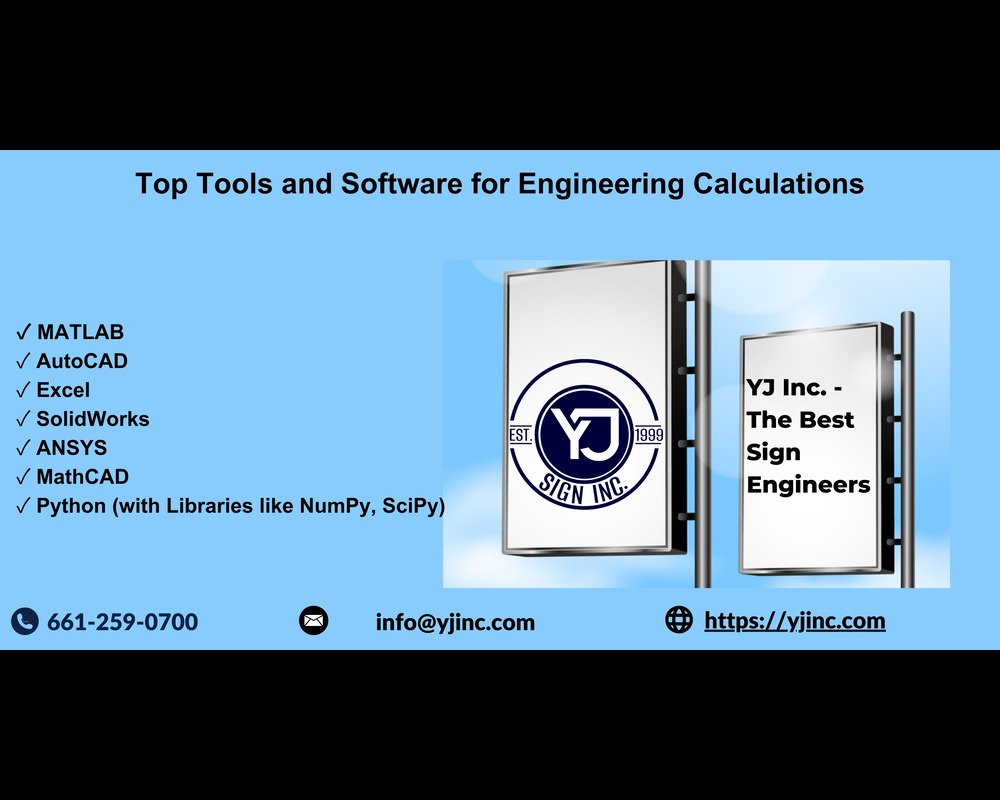In the world of engineering, precision is paramount. Whether you’re designing a new product, constructing a building, or analyzing systems, accurate engineering calculations are crucial to ensuring safety, functionality, and efficiency. To achieve the level of precision required, engineers rely on a range of specialized tools and software. This blog will explore some essential tools and software that can aid in achieving accurate engineering calculations. At YJ Inc., we understand the importance of utilizing the best resources for engineering success, and we recommend the following tools and software for any engineering professional.

1. Computer-Aided Design (CAD) Software
- Purpose: CAD software helps in creating 2D and 3D models of designs, enabling engineers to visualize and simulate different components before they are built.
- Popular Choices: AutoCAD, SolidWorks, and Fusion 360 are widely used in various industries.
- Benefits: CAD software allows for precise measurements, helps in reducing errors, and streamlines the design process by allowing quick modifications.
2. Finite Element Analysis (FEA) Software
- Purpose: FEA software assists in analyzing the structural integrity of designs by breaking them down into smaller parts called finite elements.
- Popular Choices: ANSYS, Abaqus, and COMSOL Multiphysics.
- Benefits: By simulating real-world conditions, FEA software helps engineers assess potential weaknesses and optimize their designs for strength and durability.
3. MATLAB
- Purpose: MATLAB is a high-level programming language and environment for numerical computing, particularly useful for algorithm development, data visualization, and complex calculations.
- Use in Engineering Calculations: MATLAB is ideal for engineers who need to perform large-scale calculations and data analysis, making it an essential tool at YJ Inc. for precise engineering work.
- Benefits: It supports a variety of toolboxes tailored to specific engineering fields, which enhances its versatility and applicability in solving diverse engineering problems.
4. Spreadsheet Software (e.g., Microsoft Excel)
- Purpose: Spreadsheets are a staple for quick calculations, data organization, and visualization.
- Use in Engineering Calculations: Excel is commonly used for budgeting, data analysis, and simple simulations, offering a more accessible platform for basic engineering calculations.
- Benefits: Easy-to-use formulas and functions make spreadsheets a handy tool for quick computations, data tracking, and simple models.
5. Programming Languages (Python, C++, etc.)
- Purpose: Many engineering tasks require customized scripts and algorithms that can be developed with programming languages like Python and C++.
- Benefits for Engineers: Python, with its extensive libraries and community support, is particularly popular for its application in automation, data analysis, and even machine learning in engineering calculations.
6. Structural Analysis Software
- Purpose: Structural analysis software like STAAD.Pro and SAP2000 assists in evaluating the behavior of structures under various loads.
- Benefits: These tools provide accurate assessments of load-bearing capacities, essential for projects involving buildings, bridges, and other infrastructure.
7. Electronic Design Automation (EDA) Software
- Purpose: EDA software is essential for engineers involved in designing electronic systems and components.
- Popular Choices: Tools like Altium Designer and OrCAD provide precise simulations and analysis for circuit design and PCB layouts.
- Benefits: They enable engineers to identify potential issues in electronic designs early on, ensuring that products meet required specifications.
8. Simulation Software (Simulink, Aspen Plus)
- Purpose: Simulation software allows engineers to create virtual models and test scenarios without needing a physical prototype.
- Application: Simulink, integrated with MATLAB, is useful for dynamic system modeling, while Aspen Plus is tailored for chemical process simulations.
- Benefits: These tools help in predicting system behavior under various conditions, leading to more informed decisions during the design process.
Conclusion
Selecting the right tools and software for engineering calculations is essential for precision and efficiency. Each tool mentioned here plays a vital role in enhancing accuracy, which is crucial for the success of engineering projects. At YJ Inc., we emphasize using cutting-edge tools to ensure that our engineering calculations are accurate, reliable, and aligned with industry standards. By leveraging these essential tools, engineers can optimize their workflows, improve designs, and ultimately achieve better project outcomes.
Comments on “Essential Tools and Software for Accurate Engineering Calculations”